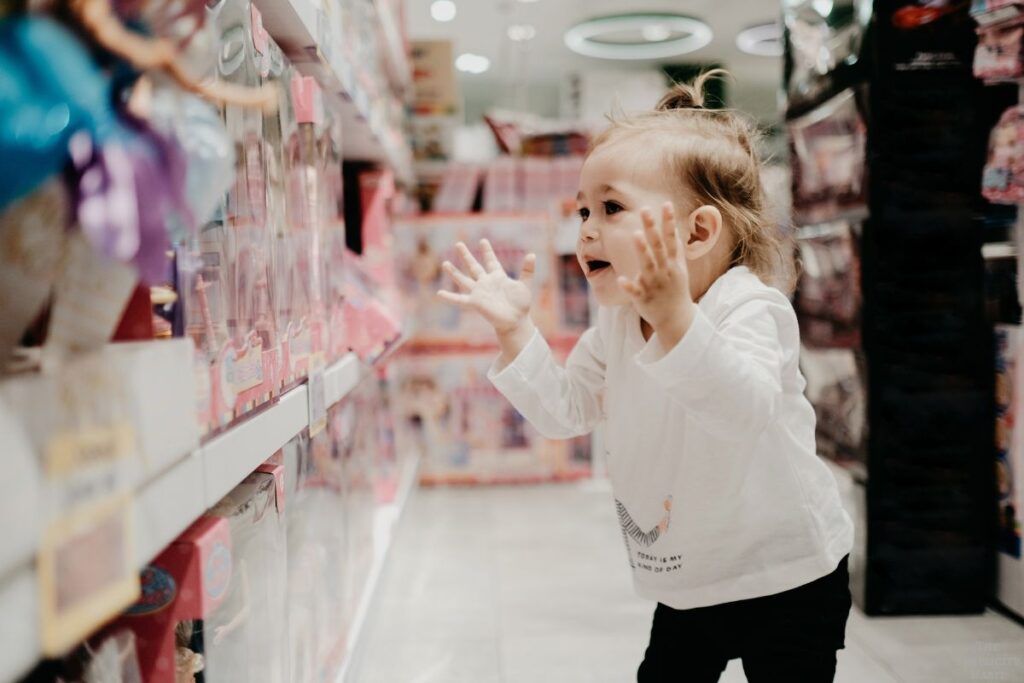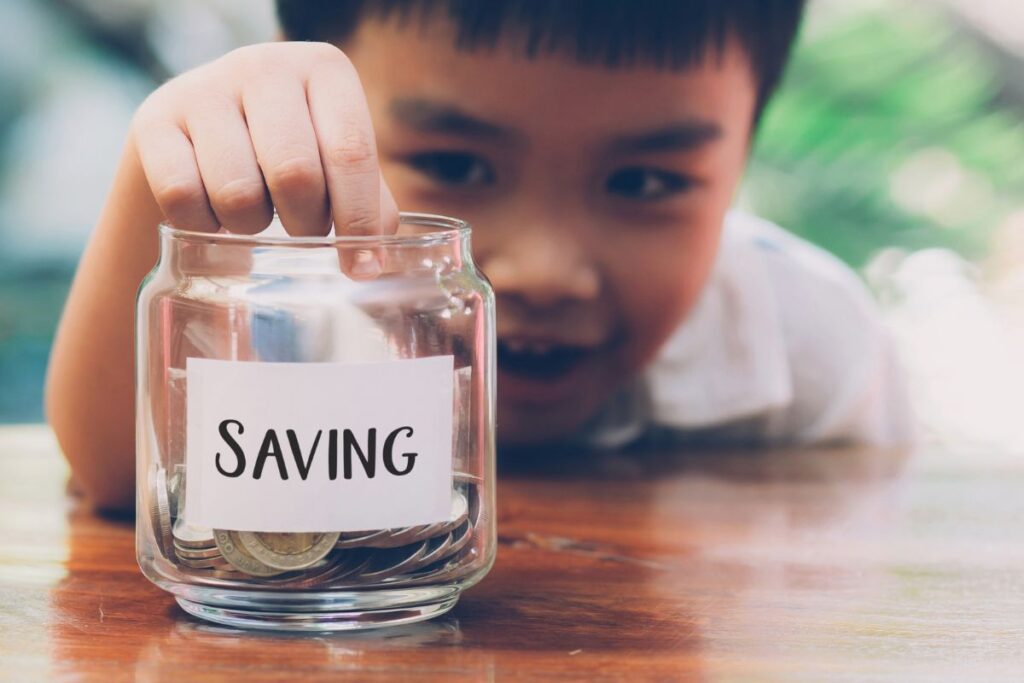Inside: Learn about kids and materialism and the impact it has on them. Use these tips to teach your kids what really matters in life.
A guest post by Rose Morrison
Kids are no strangers to materialism — they see commercials and digital advertisements pushing them to fall in love with new toys, games, and trinkets daily.
Those things can be fun but may also establish a love of materialism that makes your children unhappy in the long term.
So how do you try to prevent your kids from falling into consumerist traps?
Use these tips to help your little ones find joy outside of a materialistic culture and to focus on what really matters in life.

Kids and Materialism: Symptoms of a Problem
It’s understandable when kids get interested in new things. They’re curious — they want to experience everything the world has to offer.
However, their interactions with materialism may have crossed a line if they exhibit these symptoms:
- Always wanting something new
- Caring passionately about specific brands
- Needing new belongings to impress people
- Buying things to make themselves feel better
- Defining themselves with their possessions
While some underlying issues can lead to these symptoms — like bullies at school making your child more desperate to fit in — materialism doesn’t have to be the focus of their future.
If you want your kids to be happier, help them to simplify rather than focus on acquiring more.
Watch carefully and take action if you think they need to learn new lessons about finding meaning, identity, or happiness in life.
Teaching your kids to live simply in a consumer culture takes effort and intention. But it’s worth the work to help your kids learn what matters most in life.

Kids and Materialism: 9 Ways to Teach Your Kids What Matters Most
Use these ideas to lessen the influence of materialism on your little ones, regardless of age. With time and practice, they’ll care more about things that matter than the newest item that catches their eye.
1. Emphasize the Joy of Experiences
Parents model everything for their kids, even when they don’t notice them watching. Whenever you’re enjoying an experience with them, talk about the specifics.
Vocalize why the experience makes you happy, like how much you value the comfort of a sunset stroll with your family or talking about their day at school.
The short conversations might seem silly initially, but they show how to experience feelings outside purchases. Research shows emotional intelligence reduces reliance on materialism by boosting a person’s well-being.
Give your children a better understanding of why you focus on experiences over acquiring more stuff. Let them see and hear you appreciating the things you already have. They’ll learn a lot by observing how you approach our consumer culture.

2. Vocalize Your Priorities
Your little ones will likely see you enjoy receiving a present or buying something for yourself. They’ll also see you valuing non-materialistic things that are harder to spot, so vocalize your emotional priorities whenever possible.
After getting your kids new clothes for the school year, you could talk with them about how it’s more important that they enjoy making new friendships and being kind rather than focusing on trying to look cool.
Children need new clothes as they go through growth spurts, but use the opportunity and others like it to remind your kids what matters most. They’ll learn how to prioritize things outside of purchases more easily.
Let them see you enjoying other activities besides shopping. Kids will learn from the behaviors we model and actions we take rather than the words that we say.
Teach them how to live a more minimalistic lifestyle by modeling it for them.

3. Teach Budgeting Early
Materialism includes more than just shopping for toys and clothing — it also includes how you spend your money and what lifestyle you’re trying to achieve. Stop that form of materialism by teaching your little ones how to budget according to their ages.
The standard financial expenditure for a person with a loose grocery budget hovers around $326.70 per month, which adds up if you feed multiple children. Discuss your grocery budget with your kids and have them practice making decisions when they’re old enough to do so.
Have open conversations about money, budgeting, and priorities. The earlier they learn this valuable life skill, the better.
Sometimes, being against materialism is about more than personal values. It can also be practical for your finances. Kids who start learning about budgeting early on may do better later in life because they’ll know the importance of spending wisely.
Children who get a small allowance should get to practice paying for things. This might seem like teaching them to be materialistic, but it introduces the concept of actual value before materialism sets in. They’ll learn to spend money wisely and consider what they value beyond instant gratification.
Try these 5 practical ways to teach budgeting to your kids. The more practice they get with managing money the more confident they will be with handling their own finances.

4. Help Your Community
People driven by materialism often define themselves and others by their belongings. Kids may fall for this more easily because they think identity is that straightforward, not knowing how others struggle if they haven’t been in that same situation.
Thus, volunteering is another way to tame materialism culture in your children and remind them about what matters most.
Volunteer with your children to show them the ways people struggle and what’s really important.
If they help feed people in need, organize clothing at a donation center, or give away toys during holiday drives, they’ll have a better perspective on what matters beyond brand names and price tags.
Not only does it benefit the people that you serve, but it can help to increase the happiness of those serving as well.

5. Reconsider Gift-Giving
In considering how to lessen the influence of consumerism on kids, it’s important to think about the best way to approach gift giving at the holidays and for birthdays.
You want to send a consistent message and while it is fine to enjoy some new things, you’ll want to be selective and not overwhelm them with piles of new toys. Experiences make great gifts.
As you help them consider what they want to gift to others, think outside the box. You don’t have to buy more stuff for people who already have plenty.
Clutter-free gifts like consumables and homemade treats or presents are fun things that can’t be bought in a store.
Putting effort into handmade gifts can result in the most valuable presents. Show your little ones they don’t always need to buy things for gift-giving occasions — they could make ornaments for family members by collecting colorful ribbons and painting the see-through balls.
Maybe they’d enjoy making friendship bracelets for their friends’ birthdays. By doing so, they’ll have fun and understand the meaning behind giving someone something you made.

6. Introduce the Concept of Environmental Waste
Materialism can be bad for people, but it’s definitely bad for the environment.
Children need someone to introduce them to landfills, litter and pollution, so drive them to your local landfill or volunteer to pick up trash in a nearby park.
Explain how all the garbage was once something someone thought they needed. If people found more joy in what they already have, the planet would be healthier as we reduce consumer waste.
Young kids may not care about this lesson immediately, but they’ll keep it in their minds as they grow up. It teaches them that every choice they make affects something, whether it’s people or the planet.
Hopefully learning these lessons early will encourage them to be mindful about what companies they support by what they choose to spend their money on later in life.

7. Practice Gratitude Together
Another important thing to think about with kids and materialism is how to appreciate the things you already have.
When you make a habit of practicing gratitude and show your kids what gratitude looks like they will be more likely to follow suit.
Talk about the things you’re grateful for. Ask them to name things they’re thankful for. Noticing the simple joys in life can be a great place to start.
When you take the time to pay attention to these seemingly small things, you will begin to notice more of them. And the same can be true of your kids. It doesn’t have to be difficult or complicated. Start small by listing 3 things you’re grateful for each day.
Want more ideas? Try some of these ways to practice gratitude with your kids.
A surefire way to lessen the impact of materialism is to recognize and be grateful for the things you already have.

8. Get Other Family Members Involved
Aunts, uncles, grandparents, and cousins may mean well, but spoiling your kids will only reverse your efforts to avoid materialism.
Discuss your new parenting strategies with your loved ones so they don’t accidentally clash with how you want to raise your children.
They’ll appreciate the heads up and may want to participate by joining experiences or volunteer activities to make memories that way instead.
Relationships and expectations around the holidays can be particularly tricky, so the earlier you start these conversations, the better.

9. Pay Attention to What’s Influencing Them
A final thought on kids and materialism is to pay attention to what is influencing your child. Are they spending a lot of time on social media? Do they have certain friends who are encouraging values that you don’t want for your child?
Paying attention to how your kids are spending their time and the voices that are prevalent in their lives is important. Notice what changes or adjustments need to be made. Be proactive with adjusting rules as needed.
Perhaps it’s time to reconsider the limits with screen time. Think about what additional boundaries may be helpful including no technology at the table or in your child’s bedroom.
If your kids are older consider if you need to have a discussion about being more intentional with social media. Numerous studies have shown the harmful effects social media has on teens and tweens. Delaying or not allowing certain apps would likely be beneficial.
Have open conversations about character and values and what truly matters in life. While no one is perfect, do your best to model the values and behaviors you want to see in your kids.
Talk with your partner and determine together the best course of action for your family.
Kids and Materialism: Embrace a Simple Lifestyle Together
While your kids may be growing up in a materialistic world, they don’t have to become focused on wealth, status, and belongings. Adopting minimalism with kids is healthy for you and good for their development.
Use these strategies to reduce the influence of materialism on your children at any age.
They’ll grow up more well-rounded, and have a healthier balance in life while feeling grateful for what they already have.
Kids and Materialism: What’s your favorite tip for teaching your kids what really matters in life? Share it in the comments below!
Sign up on the form below to get weekly decluttering and simplifying inspiration sent straight to your inbox. You’ll also get the free 8 Quick Wins for Decluttering Worksheet to help you start to simplify your life today.



article is a much needed practice in all families….if only
FANTASTIC ARTICLE……. Thank you for this. I need to pass this along to my adult children who are parents. So much of this makes absolute sense and is a treasure-trove of good advice.